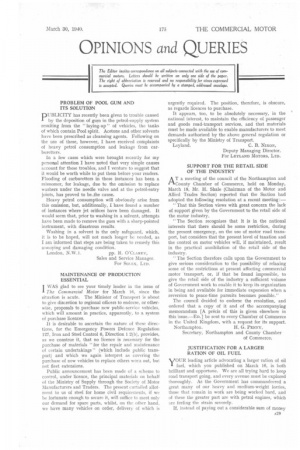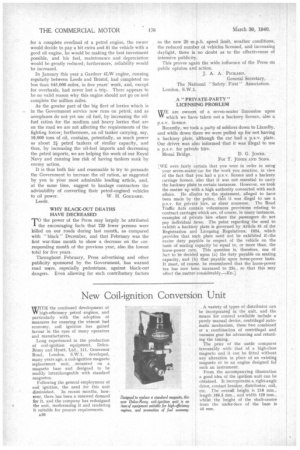OPINIONS and QUERIES
Page 39

Page 40

If you've noticed an error in this article please click here to report it so we can fix it.
The Editor invites correspondence on all subjects connected with the use of commercial motors. Leiters should be written on only one side of the paper. The right of abbreviation is reserved and no responsibility for views expressed is accepted. Queries must be accompanied by a stamped, addressed envelope.
PROBLEM OF POOL GUM AND ITS SOLUTION
pUBLICITY has recently been given to trouble caused
by the deposition of guru in the petrol-supply system resulting from the " laying-up" of vehicles, the tanks of which contain Pool spirit. Acetone and other solvents have been prescribed as cleansing agents. Following on the use of these, however, I have received complaints of heavy petrol consumption and leakage from carburetters.
In a few cases which were brought recently for my personal attention I have noted that very simple causes account for these troubles, and I venture to suggest that it would be worth while to put them before your readers. Flooding of carburetters in these instances has been a misnomer, for leakage, due to the omission to replace washers under the needle valve and at the petrol-entry joints, has proved to be.the cause.
Heavy petrol consumption will obviously arise from this omission, but, additionally, I have found a number of instances where jet orifices have been damaged. It would seem that, prior to washing in a solvent, attempts have been made to remove the gum with a sharp-pointed instrument, with disastrous results.
Washing in a solvent is the only safeguard, which, it is to be hoped, will not much longer be needed, as I am informed that steps are being taken to remedy this annoying and damaging condition.
London, N.W.1. pp. R. O'CLAREY, Sales and Service Manager. For Sor.F.,x, LTD.
MAINTENANCE OF PRODUCTION ESSENTIAL WAS glad to see your timely leader in the issue of
The Commercial Motor for March 16, since the situation is acute. The Minister of Transport is about to give discretion to regional officers to endorse, or otherwise, proposals to purchase new public-service vehicles, which will amount in practice, apparently, to a system of purchase licences.
It is desirable to ascertain the nature of these directions, for the Emergency Powers Defence Regulation 127, Iron and Steel Control 6, Direction 1 2(h), provides, as we construe it, that no licence is necessary for the purchase of materials "for the repair and maintenance of certain undertakings" (which include public transport) and which we again interpret as covering the purchase of new vehicles to replace others worn out, but not fleet extensions.
Public announcement has been made of a scheme to control, under licence, the principal materials on behalf of the Ministry of Supply through the Society of Motor Manufacturers and Traders. The present curtailed allotment to us of steel for home civil requirements, if we be fortunate enough to secure it, will suffice to meet only our demand for spare parts, whilst, on the other hand, we have many vehicles on order, delivery of which is urgently required. The position, therefore, is obscure, as regards licences to purchase.
It appears, too, to be absolutely necessary, in the national interest, to maintain the efficiency of passenger and goods road-transport services, and that materials must be made available to enable manufacturers to meet demands authorized by the above general regulation or specifically by the Ministry of Transport.
Leyland. C. B. NIXON, Deputy Managing Director. For LEYLAND MOTORS, LTD.
SUPPORT FOR THE RETAIL SIDE OF THE INDUSTRY
A T a meeting of the council of the Northampton and rACounty Chamber of Commerce, held on Monday, March 18, Mr. H. Shale (Chairman of the Motor and Allied Trades Section) reported that the Section had adopted the following resolution at a recent meeting :— " That this Section views with great concern the lack of support given by the Government -to the retail side of the motor industry.
" The Section recognizes that it is in the national Interests that there should be some restriction, during the present emergency, on the use of motor road transport, but considers that the present level of taxation and the control on motor vehicles will, if maintained, result in the practical annihilation of the retail side of the industry.
" The Section therefore calls upon the Government to give serious consideration to the possibility of relaxing some of the restrictions at present affecting commercial motor 'transport, or, if that be found impossible, to give the retail side of the industry a sufficient volume of Government work to enable it to keep its organization in being and available for immediate expansion when a reversion to peace-time pursuits becomes possible."
The council decided to endorse the resolution, and ordered that a copy of it and of the accompanying memorandum [A précis of this is given elsewhere in this issue.—En.] be sent to every Chamber of Commerce in the United Kingdom, with a request for its support.
Northampton. H. G. PENNY, Secretary, Northampton and County Chamber of Commerce.
JUSTIFICATION FOR A LARGER RATION OF OIL FUEL /OUR leading article advocating a larger ration of oil fuel, which you published on March 16, is both brilliant and opportune. We are all trying hard to keep toad transport going, and every avenue must be explored thoroughly. As the Government has commandeered a great many of our heavy and medium-weight lorries, those that remain in work are being worked hard, and of these the greater part are with petrol engines, which -Ire feeling the strain severely.
If, instead of paying out a considerable sum of money for a complete overhaul of a petrol engine, the owner would decide to pay a bit extra and fit the vehicle with a good oil engine, he would be making the best investment possible, and his fuel, maintenance and depreciation would be greatly reduced; furthermore, reliability would be increased.
In January this year a Gardner 4LW engine, running regularly between Leeds and Bristol, had completed no less than 545,000 miles, in five years work, and, except for overhauls, had never lost a trip. There appears to be no valid reason why this engine should not go on and complete the million miles.
As the greater part of the big fleet of lorries which is in the Government service now runs on petrol, and as aeroplanes do not yet use oil fuel, by increasing the oilfuel ration for the medium and heavy lorries that are on the road we are net affecting the requirements of the fighting forces; furthermore, an oil tanker carrying, say, 10,000 tons of oil, contains, potentially, as much power as about 21 petrol tankers of similar capacity, and thus, by increasing the oil-fuel imports and decreasing the petrol imports, we are helping the work of our Royal Navy and running less risk of having tankers sunk by enemy action.
It is thus both fair and reasonable to try to persuade the Government to increase the oil ration, as suggested by you in your most admirable leading article, and, at the same time, suggest to haulage contractors the advisability of converting their petrol-engined vehicles
to oil power. W. H. GODDARD. Leeds.
WHY BLACK-OUT DEATHS HAVE DECREASED
TO the power of the Press may largely be attributed A the encouraging facts that 739 fewer persons were killed on our roads during last month, as compared with " black " December, and that February was the first war-time month to show a decrease on the corresponding month of the previous year, also the lowest total for five years.
Throughout February, Press advertising and other publicity sponsored by the Government, has warned road USVIS, especially pedestrians, against black-out dangers. Even allowing for such contributory factors
as the new 20 m.p.h. speed limit, weather conditions, the reduced number of vehicles licensed, and increasing daylight, there is no doubt as to the effectiveness of intensive publicity.
This proves again the wide influence of the Press on public opinion and action.
J. A. A. PICKARD, General Secretary, The National "Safety First" Association. London, S. W .1.
A " PRIVATE-PARTY " LICENSING PROBLEM
WE are owners of a seven-seater limousine upon " which we have taken out a hackney licence, also a p.s.v. licence.
Recently, we took a party of soldiers down to Llanelly, and while down there we were pulled up for not having a hackney plate, although the car had a p.s.v. plate. Our driver was also informed that it was illegal to use a p.s.v. for private hire.
Menai Bridge. D. G. JoicEs.
For T. JoNEs AND SONS.
[WE were fairly certain that you were in order in using your seven-seater car for the work you mention, in view of the fact that you had a p.s.v. licence and a hackney carriage licence, also that it was not essential to carry the hackney plate in certain instances. However, we took the matter up with a high authority connected with such affairs. He alludes to the statement, alleged to have been made by the police, that it was illegal to use a p.s.v. for private hire, as sheer nonsense. The Road Traffic Acts contain voluminous provisions relating to contract carriages which are, of course, in many instances, examples of private hire where the passengers do not pay individual fares. The point regarding the need to exhibit a hackney plate is governed by Article 31 of the Registration and Licensing Regulations, 1924, which provides that such plate need not be exhibited if the excise duty payable in respect of the vehicle on the basis of seating capacity be equal to, or more than, the horse-power rate. This question is, therefore, one of fact to be decided upon (a) the duty payable on seating capacity, and (b) that payable upon horse-power basis. It must, of course, be remembered that the horse-power tax has now been increased to 25s., so that this may affect the matter considerably.—ED.]




























































